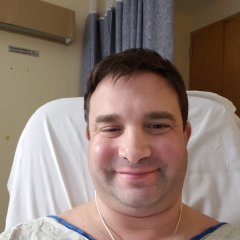-
Content Count
264 -
Joined
-
Last visited
Reputation Activity
-
 SteveT74 reacted to batty_vsg in December 2018 Sleevers!
SteveT74 reacted to batty_vsg in December 2018 Sleevers!
If you are prone to acid, or already have an ulcer, then that would be a case as well that you'd want to either not drink coffee, or maybe switch to cold brew (which is not really acidic at all.) It would kind of be treated the same way someone would deal with Tomato products (since tomatoes can also increase acid production.) I'm sensitive to tomato products (or so I think, my acid production prior to the surgery could have been a result of my weight and poor eating), so I try to reduce what I can. Right now my stomach is handling chili very well, but I'm also taking an acid reducer.
-
 SteveT74 got a reaction from quana711 in Acid reflux
SteveT74 got a reaction from quana711 in Acid reflux
I had reflux starting around 2 weeks after surgery. It presented as a persistent sore throat that lasted over two weeks. I thought I was just getting a cold and then thought it might be strep. Turned out to be GERD. I was taking pepcid, but that wasn't getting the job done. My surgeon gave me a prescription for protonix and the sore throat was gone within 48 hours.
As for preventative advice, give yourself two hours between your last meal and bed time. Also, drinking 2 tablespoons of apple cider vinegar mixed with 8oz of Water seems to help a lot too.
-
 SteveT74 reacted to Wickedwinner in 4 week PO stall.
SteveT74 reacted to Wickedwinner in 4 week PO stall.
I just had my one month checkup. I’ve lost 28 pounds but about 10 was pre-surgery. I was consuming no more than 800 calories a day, with 90-100 grams of Protein a day. I drink plenty of Water. Dr told me to up my calories to 1000-1200.
Sent from my iPhone using Tapatalk
-
 SteveT74 reacted to anonbaribabe in Tip for Newbies and Pre-Opers - EAT SLOWLY
SteveT74 reacted to anonbaribabe in Tip for Newbies and Pre-Opers - EAT SLOWLY
I just started on soft food and it's sooo hard to eat slowly. One thing that's helped me is making sure that I'm hydrated, so that my hunger doesn't escalate. The hungrier I am, the faster I want to eat. Making sure that I'm drinking Water frequently has helped.
-
 SteveT74 reacted to kjuno in December 2018 Sleevers!
SteveT74 reacted to kjuno in December 2018 Sleevers!
So I’m reading about different diets Keto seems great except lots of fat but paleo sounds pretty close to what we are allowed high Protein low carb am I right?
-
 SteveT74 got a reaction from quana711 in Acid reflux
SteveT74 got a reaction from quana711 in Acid reflux
I had reflux starting around 2 weeks after surgery. It presented as a persistent sore throat that lasted over two weeks. I thought I was just getting a cold and then thought it might be strep. Turned out to be GERD. I was taking pepcid, but that wasn't getting the job done. My surgeon gave me a prescription for protonix and the sore throat was gone within 48 hours.
As for preventative advice, give yourself two hours between your last meal and bed time. Also, drinking 2 tablespoons of apple cider vinegar mixed with 8oz of Water seems to help a lot too.
-
 SteveT74 got a reaction from FancyChristine15 in 1wk post-op easy to drink fluids already ??
SteveT74 got a reaction from FancyChristine15 in 1wk post-op easy to drink fluids already ??
It was the same for me... nothing to worry about!! Consider yourself lucky that you can get your Water in. It also bodes well for your ability to handle purees/softs. The procedure is NOT designed to restrict fluids--just solid foods. Even purees will pass through with relative ease. I am about to move on to solids, which I hear is when you really notice the sleeve. I had 4.0 oz of thinly slice roast beef for lunch with 1/2 a slice of cheddar cheese and I was full (not to the point for feeling sick or in pain--just comfortably full). It was nice since that would have been an appetizer to me in the past!!
-
 SteveT74 got a reaction from newbegjo1219 in December 2018 Sleevers!
SteveT74 got a reaction from newbegjo1219 in December 2018 Sleevers!
I haven't read much on Paleo, but I have been essentially following a ketogenic diet since surgery. I am eating less than 20g of net carbs per day, between 90-150g of Protein a day and around 30-40g of fat per day. Following a true Keto diet would require that increase my caloric intake, in the form of good fats, and probably maintain my current protein intake or even reduce it a bit. As a one month post-op VSG patient, that's not going to work for me--so this is the best I can do at this point in time. Nevertheless, I have been in ketosis for about 2.5 weeks (which is the point of keto, right???). It got me out of my first big stall and I have been on the happy train since. Also, I am probably eating more calories that most VSG patients that are 4 weeks post-op since I am having a great recovery.
Liquids go down like pre-op, so I have been able to hit the gym hard and without any discomfort. I am working out about 2 hours each morning before Breakfast (on a fast), which burns 20% more fat than after eating. My workouts have been most moderate to high intensity cardio. I am just starting to add strength training--slowly and gently--into my routine. I had my surgery on 12/17 and I am currently consuming between 750 and 1050 calories per day (most often between 850 and 950). I am eating some foods, like avocado, that are high in good fats (but are also high in calories), along with smoked salmon, eggs etc. I have cut back on protein shakes--trying to get my protein from whole foods. I weigh out all my food on a scale so I can input my food intake into MyFitnessPal app, which I use religiously. I don't trust myself to guestimate (that used to get me into trouble in past diets--like Weight Watchers). MyFitnessPal isn't perfect, but it gives you a very good idea of your caloric and nutrient intake and you can review your macros to make sure you're on track. I do get very hungry at nights--which was a big problem for me pre-op (and appears to remain a problem). I have been drinking apple cider vinegar (2 tablespoons, mixed with 8oz of Water and a little lemon juice and splenda (quarter packet)), which seems to kill the hunger and is supposed reduce insulin sensitivity.
As for results, I am now down 21 pounds since surgery (12/17) and 32 since my pre-op diet (12/3). I have also gained 6.5 pounds of muscle (mostly in my legs from Spin Class)--according to my BIA scale. Although my total numbers lost won't blow anyone away, I was a low BMI patient (had lots of nasty co-morbidities)--so those are impressive for me (I think). I am really thrilled though, since I have gone from wearing a size 42 (which were snug) on 12/3 to a size 36 pant as of today (and they look nice on me!!!). That's 6 pant sized in 6 weeks. This is the thinnest I have been in at least 12 years and I am just getting started. I still have 40 pounds to go, but I honestly feel I can get there for the first time in my life!
-
 SteveT74 reacted to Lolo 2020 in December 2018 Sleevers!
SteveT74 reacted to Lolo 2020 in December 2018 Sleevers!
Hi Sophie , had my surgery done on the 20 th by DR Shillingford near boca . I am down 30lbs since I started the preop diet , 25 since surgery . Also on purées and soft foods . Have tried chicken salad and didn’t do well so I am sticking with 2’protein drinks a day and a little cottage cheese . Have only been able to get down soft flaky fish as a proper solid here and there . At 600 calories a day and 60-80g of Protein the weight is steadily coming off 3-4 lbs a week. Interestingly the more liquid I drink, the more I lose . Getting close to the 200 mark now and really can’t wait , haven’t been under 200lbs in 20 years !
-
 SteveT74 got a reaction from AngieD3 in VSG with a lower BMI
SteveT74 got a reaction from AngieD3 in VSG with a lower BMI
Insurance companies generally make their assessment based on your weight at the initial consultation. If you have been approved for surgery, the weight you lose pre-surgery is fine and expected when you go on the pre-op liquid diet!
I am in the same boat as you. I had my surgery on 12/17 with a BMI around 34. Generally, people with lower BMI's tend to do better than average with the VSG. In a number of studies, they found that a 95% of people with a BMI below 40 reached a BMI under 30 within 12 months of surgery. They were also far more likely to lose 70-80% of their excess weight something in the order of 60% of people receiving a VSG with a BMI under 40 were likely to loose 75% of their excess body weight (with many losing 100% or more of their excess body weight). I don't know of any studies of people with BMI's under 35 at the time of surgery, but I would expect the likelihood of a happy outcome to be very high.
Personally, my highest recorded weight was 256. I was 243 when I started my pre-op diet on 12/3. I was 231 on my day of surgery (12/17). And 22 days post-op, I am down to 216 with a BMI of ~32. I am only 16 pounds away from a BMI of 29.8 (officially not obese!). This is the lightest I have been in over 10 years (I got very close to 216 close on two diets, but with lots of suffering and a huge and fast rebound). I have no idea what I'll weight when this weight loss phase of this journey reaches its bottom, but I am just focusing on eating a healthy diet (following my group's plan to the letter) and getting lots of exercise (which is easier when you start the journey at a lower BMI).
-
 SteveT74 got a reaction from BankerRad in lapband to sleeve
SteveT74 got a reaction from BankerRad in lapband to sleeve
I don't think you should be anymore worried about the sleeve than you were with the band. Even though the sleeve seems more radical, from a surgery and risk standpoint, the sleeve is probably safer. You're not installing a foreign body that could slip, dislodge or cause significant injury. For me, the recovery from surgery has been a relative breeze (not the case for everyone), but I honestly had very little pain after surgery and no nausea. I was drinking normally (without restricting) after 3 days and I haven't had an issue with eating at all. Obviously, there is an adjustment to the new restriction, but that's probably something you're already familiar with after the sleeve. After any surgery, there's always going to be something.
My aunt has a band and, frankly, I think my recovery from the sleeve was easier than hers. I was expecting to be in a lot of pain, with terrible gas issues etc. I know everyone's experience is different, but I recall having a little pain and nausea when I first came out of anesthesia (which you can barely remember anyway). I know I told them I had pain and nausea when the attending nurse was talking to me--but I also recall thinking, give me the good stuff now because I don't want to feel pain and nausea (if it does happen). They gave me a little something and I went back to sleep. I woke up a few hours later and all I could think about was how badly I needed to pee--which isn't easy after being under general anesthesia. Aside from needing to pee, I had no nausea and no pain. I had some gas and bloating (to be expected), but it wasn't terrible at all!!! I was on the floor with a women who got a lap band the same day I was sleeved. She had the same gas etc that I had. I don't think that part of the experience really differs much between the procedures. I had gas-ex chewables that I brought to hospital with me and that really helped. I slept sitting up the first couple of nights (get a good travel/neck pillow), which was more comfortable for me. Keep walking--it helps.
Longer term, I really snapped back quickly. I could drink normally after a couple of days. My program had me start on the puree/soft food stage right after I was released from the hospital (which is different from most). After a couple of days, I could eat relatively normally as well. Obviously, I can't eat large quantities any more, but I can definitely eat a 4-6oz piece of tilapia (stuffed with lump crab meat and a little ricotta) and I feel very satisfied. In the beginning you can feel everything you swallow all the way down into your stomach. I haven't felt that in a week or two. I was frankly worried that my doctor didn't make my sleeve small enough or that the surgery isn't working right--since I was able to drink so easily and eat without feeling pain or discomfort--but I think I am just lucky. I have had issues with Constipation and GERD, but these are all manageable.
Most importantly, the weight is coming off!!! I have lost 18 pounds since surgery (and 30 since I started my pre-op diet). I have dropped 6.5 inches off my waistline since the day of surgery. As of this week, I have been taken off all my diabetes medications. Obviously, my initial concern that the surgery wasn't going to work for me, was misplaced!!! That said, I am highly motivated to loose this weight and live a healthy lifestyle. This is the first time in 15 years that I actually believe and know that I can have the body and good health I deserve. I am also not relying on the surgery to do all the work for me. I am sticking very closely to my doctor's post-op diet guidelines. The only modification that I made was to cut carbs down to 20g net carbs per day and to focus on eating my Protein first and then good fats along with it (like avocado). I have also been hitting the gym--treadmill, elliptical and spin classes (I haven't been cleared for weight training yet).
In short, having this operation was one of the best decisions of my life. I have no regrets (other than not doing it sooner)!!!! Don't be nervous!!! It's going to be worth it!!!!!
-
 SteveT74 got a reaction from LadySin in 4 months out and FRUSTRATED!!!!!!
SteveT74 got a reaction from LadySin in 4 months out and FRUSTRATED!!!!!!
I am a sleeve, not a bypass--but my surgical uses the same post-op diet plan for both procedures, with only minor differences in terms of supplementation. It's really hard to look at one person's macro and diet and use that as a basis to determine what's best for you. We all have our own issues and challenges to deal with. We also all have issues with stalls, although I agree that a month and a half is on the long side. The fact is, however, you started off at 311 when you had surgery in late August 2018 and you're now down to 235 as of today. Since you've been stalled for one and half months, that means you lost 75 pounds in a 4 month period. That's a LOT of weight in a very short period of time. Shorter than I think is common. Maybe a long stall isn't entirely unusual in these circumstances. That said, if you're eating less than 600 calories a day 5 months out of surgery, that seems really low. I am just finishing up my soft/puree phase and I am consuming between 700 and 900 calories per day. I expect that to go up to 1200 calories or so per day over the course of this year--maybe even 1500.
I have been essentially following my doctor's guidelines, which means eating three meals per day that cause me to consume at least 70g of Protein per day. I am also drinking more than 64oz of Fluid per day, which maybe one of the most critical ingredients to weight loss. While my post-diet (at least for this phase of my recovery) doesn't limit me in terms of macronutrients (provided I hit my protein goals), I have chosen to limit myself to 20g or less of net carbs (which does not count Fiber or sugar alcohols consumed). I have also chosen to eat only foods that have good quality sources of fat--like avocado, fish (and fish oils) etc. As a result, I have put myself in a state of ketosis, which seems be really helping me make the most out of my sleeve (at least for now). I would NOT say that I am following a Keto diet, since more than 50% of my food intake is coming from protein and maybe 35-40% is coming from fat, with less than 10% coming from carbs (it varies day to day, but carbs are always under 20g). I am also trying to exercise daily--not just take a walk, but really work up a good sweat and get my heart rate of to 80% max. I am not suggesting you do what I am doing--everyone needs to find their own best path--but if you're in a prolonged stall it's best to change things up. If I were in your shows, I would try hard to get in more protein and fats (to the extent you can tolerate them) and get your calories up closer to a 800 a day. I get that you might not be able to eat the fat at this point depending your sensitivity to dumping, but you can't continue doing the same thing that isn't working for you at the moment. You need to change a couple of things up to restart your weight loss engine. If that means drinking an extra Protein Shake or getting in an extra little meal to reach a new calorie/protein goal, then do it. See how it goes for a couple of weeks.
Also, if your nutritionist isn't helpful, is there another bariatric nutritionist you could speak to???
-
 SteveT74 got a reaction from FancyChristine15 in 1wk post-op easy to drink fluids already ??
SteveT74 got a reaction from FancyChristine15 in 1wk post-op easy to drink fluids already ??
It was the same for me... nothing to worry about!! Consider yourself lucky that you can get your Water in. It also bodes well for your ability to handle purees/softs. The procedure is NOT designed to restrict fluids--just solid foods. Even purees will pass through with relative ease. I am about to move on to solids, which I hear is when you really notice the sleeve. I had 4.0 oz of thinly slice roast beef for lunch with 1/2 a slice of cheddar cheese and I was full (not to the point for feeling sick or in pain--just comfortably full). It was nice since that would have been an appetizer to me in the past!!
-
 SteveT74 got a reaction from Bebeak in December 2018 Sleevers!
SteveT74 got a reaction from Bebeak in December 2018 Sleevers!
I am really glad you posted this. I have been a little worried because my recovery has been so easy. It hurt to drink on the first 2 days. But I am 6 days post-op and I can almost drink like normal. I don't think I could chug a whole Snapple, but I don't need to take small sips either. That said, I am in the soft/puree stage on my program's diet and an ounce of food will cause pain and make me pound my chest and have to take a walk. I am also losing a pound a day since surgery, so something is working. If you can drink with relative ease, I think you should just consider yourself lucky!! It doesn't mean your sleeve is too big or anything like that. You are just healing well and ready to move to the next stage.
-
 SteveT74 got a reaction from MzToya in A1C dropped from 7.1 to 5.8
SteveT74 got a reaction from MzToya in A1C dropped from 7.1 to 5.8
Add me to the list. My A1C's have never been higher than 7.1, but I have morning syndrome--so I would get big spikes in my blood glucose in the AM. Pre-surgery I was taking 1000mg of MetFormin a day and 1.8mg of Victoza. Even with the meds, my morning glucose readings were anywhere from 125 to 170. When I was discharged from the hospital after surgery, I was cut down to just 500mg of MetFormin a day. For the past 10 days, my morning readings were between 79 and 105. My PCP suggested I stop the MetFormin and see how my blood sugars are doing. So, without the metformin, I had a BG reading of 82! I'll see how it goes over the next couple of days, but I am really excited by this! I am not going to have my blood work done until March, but I hope I see a big drop in my A1C's just like you guys.
-
 SteveT74 got a reaction from Abbey M. in Can you drink too much?
SteveT74 got a reaction from Abbey M. in Can you drink too much?
No, you can't hurt yourself or damage your sleeve from drinking too much or too quickly. The pain you feel will stop you for going to far and liquid will pass through your stomach and right through your pyloric valve without resistance. You are told to take small sips frequently in order to make sure you are well hydrated and not in physical discomfort. After your stomach swelling subsides, you'll be able to drink like normal. I was sleeved on 12/17 and I can already drink the same as I did before surgery (big gulps). Since I can drink "normally", I haven't been taking sips constantly, but always have my water bottle handy and drink regularly--hitting at least 64 ounces a day and sometimes closer to 100. The drinking really is a big key to rapid weight loss.
-
 SteveT74 got a reaction from Abbey M. in Can you drink too much?
SteveT74 got a reaction from Abbey M. in Can you drink too much?
No, you can't hurt yourself or damage your sleeve from drinking too much or too quickly. The pain you feel will stop you for going to far and liquid will pass through your stomach and right through your pyloric valve without resistance. You are told to take small sips frequently in order to make sure you are well hydrated and not in physical discomfort. After your stomach swelling subsides, you'll be able to drink like normal. I was sleeved on 12/17 and I can already drink the same as I did before surgery (big gulps). Since I can drink "normally", I haven't been taking sips constantly, but always have my water bottle handy and drink regularly--hitting at least 64 ounces a day and sometimes closer to 100. The drinking really is a big key to rapid weight loss.
-
 SteveT74 got a reaction from Abbey M. in Can you drink too much?
SteveT74 got a reaction from Abbey M. in Can you drink too much?
No, you can't hurt yourself or damage your sleeve from drinking too much or too quickly. The pain you feel will stop you for going to far and liquid will pass through your stomach and right through your pyloric valve without resistance. You are told to take small sips frequently in order to make sure you are well hydrated and not in physical discomfort. After your stomach swelling subsides, you'll be able to drink like normal. I was sleeved on 12/17 and I can already drink the same as I did before surgery (big gulps). Since I can drink "normally", I haven't been taking sips constantly, but always have my water bottle handy and drink regularly--hitting at least 64 ounces a day and sometimes closer to 100. The drinking really is a big key to rapid weight loss.
-
 SteveT74 got a reaction from Ed_NW in 2 Years Post OP and struggling
SteveT74 got a reaction from Ed_NW in 2 Years Post OP and struggling
I think you already know many of the answers to your questions. You got out of your healthy rhythm and need to find the motivation to get back on track. I would suggest you make an appointment with the nutritionist at your surgeon's practice to discuss what's going on with your weight loss. You don't want to let it go for too long. If you think working with a personal trainer will get you motivated, go for it! Weight is lost in the kitchen, not the gym--but, working out can be a good motivator for eating healthy.
Also, you can definitely do Keto after bariatric surgery. I am only 3 weeks out and I am essentially doing keto. Obviously, I am eating more Protein and my macro doesn't look exactly like the ideal Keto macro, but I cut my carb intake to less than 20g of net carbs per day. I am getting my 100g + of protein a day and the rest of my calories are from healthy fats like avocado. It's been enough to put me into a state of ketosis and I think it's helping me along the way. Plus, I am very happy with the foods I am eating. For me, this is a sustainable lifestyle. If you're a carb addict, it can be hard to give up those carbs--it takes about 4 days to get through the "withdrawal" and even a little longer with keto, but it's totally doable. You can definitely do it... think about how you were able to handle the pre-op liquid diet. Keto is way easier than that!!!
-
 SteveT74 reacted to chris_marie in December 2018 Sleevers!
SteveT74 reacted to chris_marie in December 2018 Sleevers!
I had surgery 12/18/18. It hasn’t been a piece of cake but it’s gone pretty well I think. I didn’t have any anesthesia issues. So far no nausea no vomit 🤮. Knocking on wood. ❤️❤️ I am still mostly liquids. Or purée in limited quantities of course. I still struggle daily with getting in all my Water and Protein. But so happy the surgery and the waiting is over. ❤️. Happy to be part of the December sleevers!
-
 SteveT74 got a reaction from rs in Major buyers remorse😭
SteveT74 got a reaction from rs in Major buyers remorse😭
I don't think anyone can go through a surgery like this without having some discomfort. The pain will go away in a couple of days. I was lucky that the gas wasn't too terrible for me--I expected it to be terrible, but it was only mildly bothersome. I walked a LOT and took my gas-ex chewables and that helped tremendously. For me, surgical pain was no big deal and I was able to eat and drink without any issues with relative ease. However, I developed a respiratory infection a few days after surgery and there's nothing like a hacking cough after stomach surgery!!! I had level 10 pain every time I coughed (which was every minute or two). I also have had a chronic sore throat (feels like bad strep, but it's not) for the past two weeks. I am seeing my surgeon next week and it's probably GERD. So, we all have our crosses to bare!!
I can't say this has been a picnic for me, but I have NO regrets. I am down 17 pounds since the day surgery (12/17) and 28.5 pounds since I started my pre-op diet (12/3). I lost 6 inches on my waist since the day of surgery!!! My blood glucose levels when I wake up (which were always over 125 before surgery) are now in the normal range (79-102) for the past two weeks. I was taken off most of my meds when (except MetFormin) when I left the hospital and, yesterday, my PCP took me off the MetFormin--so I am not on any diabetes meds!!! That's huge!!! I still have high blood pressure, but I am hopeful I can get off blood pressure meds as I lose more weight and exercise etc. Plus, I had issues with my ankle after I severely sprained it last year. After losing 30 pounds, the ankle is 80% better---and I bet it will be 100% better with some more time (and more weight loss). That will save me orthopedic surgery!!
Bottom line is there's always a price to pay when you need to correct something like morbid obesity (and it's co-morbidities). For me, some short term pain and a little GERD is well worth the price of getting my T2DM into remission (hopefully)! When you're struggling in the beginning (like we have), you have to keep your eye on the big picture. You're not going to really remember the pain a year from now, when you look and feel great.
-
 SteveT74 got a reaction from rs in Non Scale Victories
SteveT74 got a reaction from rs in Non Scale Victories
Wow, you look great!!! Like a butterfly emerging from chrysalis!! Congrats!!!!
-
 SteveT74 got a reaction from rs in Non Scale Victories
SteveT74 got a reaction from rs in Non Scale Victories
I have got one to add. I was just sleeved on 12/17, mostly to treat my T2DM. Before surgery, every morning my blood glucose levels were over 125 (usually over 130), and that was with taking 1000mg of MetFormin and 1.8mg of Victoza daily. I was taken off the Victoza when I was discharged from the hospital and cut to 500mg of MetFormin. For the past 10 days, my morning blood glucose levels have been between 79 and 105. I talked to my PCP yesterday, and he took me off the MetFormin to see how I do. Today, I had a morning blood glucose level of 82 without the MetFormin. So, I am officially off all of my T2DM medications!!!! For me, that's huge!!! As much as I want to lose weight, getting my T2DM under control was the biggest reason for me having this surgery.
-
 SteveT74 got a reaction from LadySin in Not telling, not even my spouse?
SteveT74 got a reaction from LadySin in Not telling, not even my spouse?
I can understand not telling friends, family and co-workers about your surgery, but I don't see how you can conceal it from your spouse. Do you really want him to find out after the fact, when you're on your post-op diet and are dealing with all the usual post-op recovery issues??? It's not like he wont see the incisions on your body. How will that conversation go when he finds out after the fact?? The fact is, if your husband is not supportive to the point you feel you have to conceal this from him, you need to consider whether you should be staying in this marriage. This is not a healthy situation.
-
 SteveT74 got a reaction from LadySin in Not telling, not even my spouse?
SteveT74 got a reaction from LadySin in Not telling, not even my spouse?
I can understand not telling friends, family and co-workers about your surgery, but I don't see how you can conceal it from your spouse. Do you really want him to find out after the fact, when you're on your post-op diet and are dealing with all the usual post-op recovery issues??? It's not like he wont see the incisions on your body. How will that conversation go when he finds out after the fact?? The fact is, if your husband is not supportive to the point you feel you have to conceal this from him, you need to consider whether you should be staying in this marriage. This is not a healthy situation.












